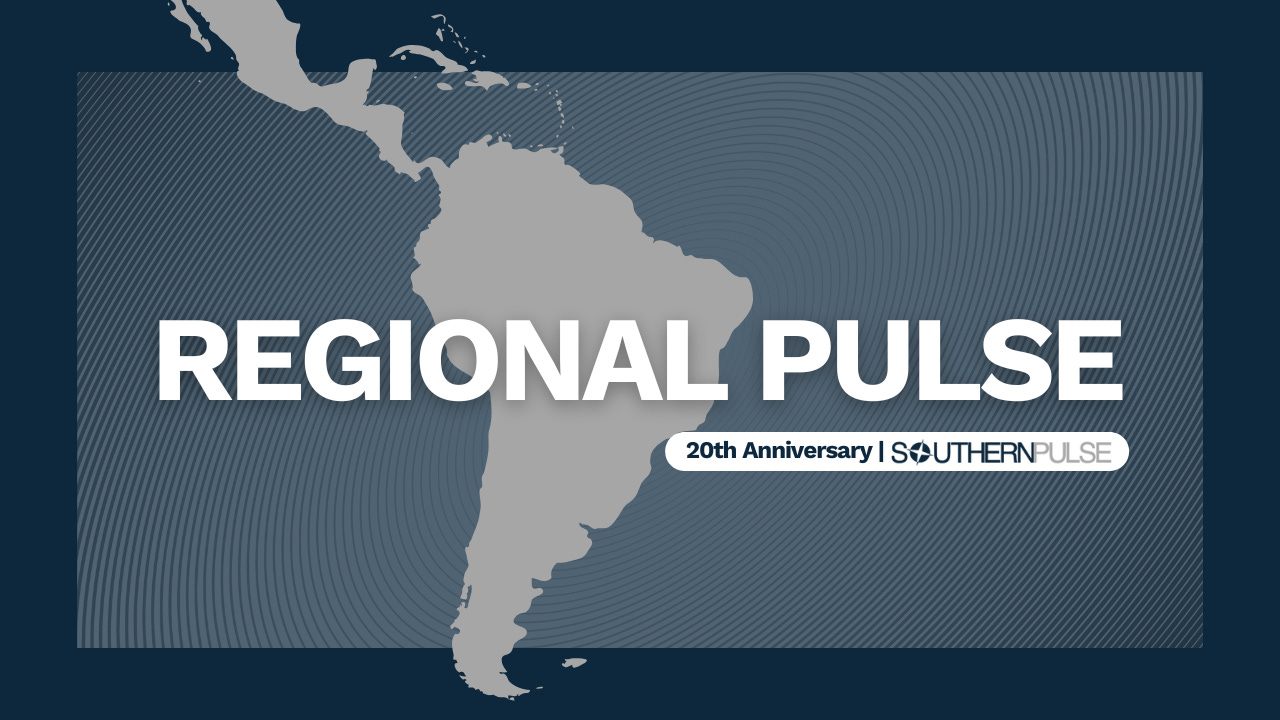The Week Ahead: 14-20 April 2025
Welcome to Southern Pulse’s weekly newsletter, where we dive into the major events and headlines set to shake things up in Latin America this week. We’ll keep you updated on key topics we’re watching and events to keep an eye on. If you were forwarded this newsletter, you can subscribe here:
The Week Ahead
This week's most important events include a visit from Salvadorian President Nayib Bukele to the US following President Trump’s invitation, as well as the likely approval of a portion of the loan that Argentine President Javier Milei requested from the IMF. This week also sees the beginning of Semana Santa, or Holy Week, with many countries in the region enjoying holidays.
Research for this newsletter was supported by Nelson, our AI-powered Latin American research companion. If you'd like to know more about Nelson, click here.
Monday 14 April
Holidays: 🇨🇷 🇭🇳 🇻🇪 Costa Rica, Honduras, and Venezuela observe this day as Holy Week holiday until Wednesday 16 April. | 🇺🇾 There is a Bank Holiday in Uruguay until Wednesday 16 April.
🇸🇻 🇺🇸 Salvadorian President Nayib Bukele will meet his US counterpart Donald Trump in The White House. Trump extended an invitation to Bukele to thank him for allowing the use of El Salvador’s maximum security prison as a detainment center for US deportees. Bukele has not confirmed whether he would discuss the 10% tariffs Trump imposed on Salvadorian products.
🇵🇪 🇩🇪 A German court will rule on a case against German company RWE for environmental damage in the Peruvian Andes. The company is accused of being partially responsible for accelerating the melting of a glacier in the Andes. The case, which is overseen by the Hamm Higher Regional Court, could set a global precedent in climate justice.
🇦🇷 🇺🇸 US Treasury Secretary Scott Bessent will travel to Buenos Aires to meet Argentine President Javier Milei and Economy Minister Luis Caputo as well as representatives from the private sector. Bessent will discuss foreign investment, financial cooperation and fiscal stability with his Argentinian counterparts. The visit will take place shortly before the International Monetary Fund (IMF) advances USD20 billion to the Argentinian government as part of its latest bailout of the South American country (see Friday 18).
Tuesday 15 April
🇵🇪 A Peruvian court will rule on the trial against former president Ollanta Humala for alleged illegal campaign contributions in 2006 and 2011. The court will consider the contributions allegedly received by the Brazilian company Odebrecht and other illegal financing sources. Humala has denied the accusation.
Wednesday 16 April
🇦🇷 In Argentina, pilots of Aerolíneas Argentinas will strike for 12 hours. The Airline Pilots Association (APLA) – an aviation workers union – will protest a series of unresolved labor disputes, including backpay. It takes place days after the general strike called by the General Confederation of Labor (CGT) which took place on 10 April against President Milei’s government austerity measures.
Thursday 17 April
Holidays: 🌎 Various countries in the region celebrate Maundy Thursday; some as a national holiday, such as Costa Rica and Colombia, while others just observe it without it being a public holiday, such as Argentina.
💡 Nothing pressing for today. Did you know that our AI-driven research assistant, Nelson, has established collaborations with prominent individuals and organizations across Latin America? Recently, we announced our latest partnership with Dr. Evan Ellis, a renowned research professor specializing in Latin American Studies at the US Army War College Strategic Studies Institute. Dr. Ellis has authored over 500 publications, focusing primarily on the relationship between China and Latin America. His work is now accessible to all Nelson users.
Friday 18 April
Holidays: 🌎 Most countries in the region observe Good Friday. | 🇭🇳 Honduras celebrates Pan American Day, commemorating the establishment of the International Union of American Republics in 1890.
🇧🇴 The Bolivian Supreme Electoral Tribunal (TSE) will conclude the registration of political coalitions for August’s general elections. The TSE ruled that political organizations have until 18 April to register their alliances ahead of the 17 August general election. The political scenario is uncertain at this time. Analysts predict a vote primarily split between incumbent President Luis Arce from the ruling “Movement to Socialism” (MAS) and his former ally and predecessor, Evo Morales; in addition to the traditional opposition.
Weekend
Saturday 19 April
Holidays: 🌎 Most countries in the region celebrate Holy Saturday. | 🇺🇾 Uruguay celebrates the Landing of the 33 Patriots Day, which commemorates the return of Juan Lavelleja and his 33 exiled fighters in 1825. | 🇻🇪 Venezuela celebrates Independence Declaration Day, which commemorates the independence declaration from the Spanish Empire in 1810.
🇦🇷 In Argentina, the provisional national electoral roll will close in line with the electoral calendar. Voters aged 16 and above will head to the polls later this year for the midterm elections scheduled for 26 October. The election is highly anticipated, as half of the seats in the Chamber of Deputies and a third of the Senate will be up for grabs.
Sunday 20 April
Holidays: 🌎 Most countries in the region celebrate Easter Sunday.
🖥️ Want to learn more about Nelson, our AI-powered research assistant for Latin America? Don’t miss our article that explains who he is, what he does, and how he can assist you and your team in navigating Latin America effectively.
Keeping an Eye On
In this section, we highlight topics or people we will be monitoring during the week.
🇲🇽 🇧🇷 Are we any closer to the ever-elusive Latin American unity?
A hundred years ago, international observers would have bet on Latin American unity taking place long before Europe’s. After all, Latin America was largely united by a common language (and its Portuguese relative), religion, similar culture and a relatively shared history. Meanwhile, Europe was fractured by religious, cultural, and linguistic divisions – before considering long-standing imperial rivalries and centuries of warfare. And yet, Latin America is no closer to unity now than it was then. Or is it? In the latest CELAC meeting, regional leaders spoke at length about the need to unite in the face of an increasingly aggressive northern neighbor. The presidents of the largest countries in the region – Mexico and Brazil – spoke of increasing trade between them. If the region could take any lessons from the European Union, one would be that regional integration usually works when the two largest countries are leading it. A truly closer relationship between Mexico and Brazil – historically estranged countries – could signal a new beginning in hemispheric relations. The region could take a second pointer from the EU’s history: integration needs to be driven by state interests, not partisan objectives. In other words, Brazil and Mexico’s rapprochement cannot be solely based on the ideological affinities of their leaders. It needs a solid material and geopolitical incentive. Could the Trump presidency provide one? So far, the US government has largely exempted Mexico from its punitive tariffs, keeping both North American economies deeply intertwined. Should this change, the Mexican state may gain a powerful reason to turn towards its Brazilian friends. We’ll be keeping an eye on whether the US government – inadvertently – creates the conditions for the ever-elusive Latin American unity.
🇭🇹 As Haitian authorities launch the first drone strikes in the hemisphere, will other governments follow?
Few readers may know that Caribbean states are pioneers of aerial warfare in the region. In 1932, the Cuban government launched one of the first air bombardments in Latin America against a group of rebels. In 2025, Haiti has written a new page in this grim history by launching the first government-sanctioned drone strikes against criminal gangs. The attacks, however, are shrouded in secrecy. According to Washington Post reporting, Haitian authorities refuse to acknowledge publicly their existence, although government officials say off the record that there’s a special task force guiding operations. The first strikes were reported in March, injuring at least nine civilians. While their effectiveness against gangs is disputed, some citizens have taken to social media to praise the bombardments for instilling terror on criminals. This marks a significant departure in the region. Until now, drones had been widely used by criminal groups in places like Colombia or Mexico to attack rivals or terrorize the civilian population. But to date, governments have exercised self-restraint when it came to responding in kind. However, Haiti’s experimentation with attack drones sets a dangerous precedent. Will other countries follow suit with allegedly ‘targeted’ strikes of their own? One administration might be watching keenly: according to NBC, the US government is mulling the possibility of using drone strikes against criminal organizations in Mexico. We’ll be keeping an eye on whether Haiti sets a dangerous precedent for the region.
Upcoming Events
The Atlantic Council is set to release a new report on 16 April, focusing on “Navigating the US-PRC Tech Competition in the Global South.” The document analyzes the current state of competition in emerging technologies between the US and China and discusses its ramifications for countries in the Global South.
On 22 April, The Inter-American Development Bank (IDB) will facilitate a discussion with central bank presidents from Latin America and the Caribbean to gain direct insights into important monetary and financial trends in the region.
The Center for Strategic & International Studies' Project on Prosperity and Development is set to host the ninth annual Global Development Forum (GDF) on 23 April. This forum will gather experts and key players to explore future opportunities and necessary steps for US engagement with developing and emerging market countries worldwide.
The 55th Washington Conference on the Americas is scheduled for 7 May. The event will include keynote speeches and interviews with cabinet officials and international leaders, along with high-level panel discussions featuring industry experts. Attendance is available in person for organization members, non-members, and invited guests; although registration is required.
Thanks for taking the time to read The Week Ahead. If there's something you think we overlooked, or you'd simply like to share your thoughts, we'd love to hear from you. Feel free to reach out at press@southernpulse.com.
CC BY-ND









